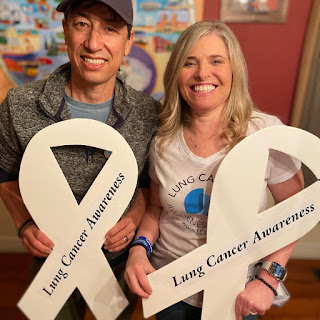Precision Medicine: Where Are We In Lung Cancer?
Lung cancer is the most common cause of cancer mortality
globally, responsible for nearly 1 in 5 cancer-related deaths, or an estimated
1.6 million people. In the U.S., lung cancer is by far the leading cause of
cancer-related death among both men and women; more deaths are caused by lung
cancer every year than by breast, prostate, and colon cancer combined. But after years of modest growth in new
treatment options, there is much cause for hope. In 2015, the FDA approved six
new drugs for the treatment of lung cancer—a one-year record – including two
new immunotherapy drugs, nivolumab (Opdivo®) and pembrolizumab (Keytruda®).
These approvals were landmark events for the treatment of lung cancer in 2015.
And the scientific evidence is accumulating that genomic
testing and targeted therapies for lung cancer patients, particularly those who
have advanced, or metastatic non-small cell lung cancer (NSCLC) make a
significant difference in outcomes. The most
useful biomarkers for predicting the efficacy of targeted therapy in advanced
NSCLC are genomic alterations called "driver mutations”. Genomic tests for driver mutations have become
an increasingly standard part of the diagnostic work-up for NSCLC patients, and
the testing is useful in choosing whether a patient receives chemotherapy (if
there is not a targetable driver mutation) or an FDA-approved targeted therapy
up-front. The best characterized of
these biomarkers are epidermal growth factor receptor (EGFR) mutations and
(anaplastic lymphoma kinase) ALK translocation. Identification of these biomarkers
has led to highly targeted treatments that have resulted in major advances in
prolonging survival - without the harsh side effects of chemotherapy. Patients
with specific genetic mutations may benefit from targeted therapies such as the
EGFR blockers erlotinib (Tarceva®), afatinib (Gilotrif®), and gefitinib
(Iressa®), to name a few.
Lung cancer treatments are advancing so fast that it’s
important to get tested to find out if a patient has an identifiable mutation.
Patients with advanced NSCLC, and their caregivers need to have the
conversation with their care team about getting tested and understand the
abnormality that is causing the cancer. If a therapy exists patients are having
good outcomes. If there is not a targetable mutation, patients can find
clinical trials that may help prolong life. Not every driver has an effective
treatment, but according to the
LCMC II study nearly 60% of NSCLC adenocarcinoma patients are likely to
have a driver gene that can be targeted with approved drugs or those in a
clinical trial. This is amazing progress in lung cancer treatment, and made
possible by cancer research. The basic research done 10 years ago is leading to
breakthroughs today. It’s why I support the vision of the #CancerMoonshot
program’s aim “to make a decade worth of advances in cancer prevention,
diagnosis and treatment in five years."
A
recent article by Dr. Lecia Sequist (Associate Professor of Medicine,
Harvard Medical School) and Dr. Joel Neal (Assistant Professor of
Medicine–Oncology, Stanford University/ Stanford Cancer Institute) shares good
information about the professional medical organizations that recommend analyzing
either the primary NSCLC cancer tumor or a metastatic tumor for EGFR and ALK,
regardless of patient characteristics (such as age, race, or smoking history). And
The
National Comprehensive Cancer Network guidelines for metastatic non-small
cell lung cancer strongly recommend
testing for alterations in EGFR, ALK, and ROS1 genes, as well a broader genomic
panel to look for driver genes that might have clinical trials available. In
this shifting landscape in lung cancer treatment, molecular testing may
identify a targeted treatment, or help find a clinical trial. Patients need to
be their own health care advocates.
#CancerResearchEvangelist
